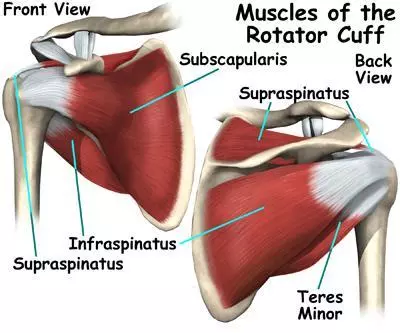- Home
- Patient Care
- Services
- Shoulder & Elbow
- Overview
- Rotator Cuff
- Information about rotator cuffs
Information about Rotator Cuffs
Your rotator cuff is made up of four small muscles arising from your shoulder blade. As these muscles travel from the shoulder blade towards your shoulder joint, they join together forming one tendon that attaches to the ball portion of the ball and socket joint. Three of the muscles are located on the top and back of your shoulder. The other muscle is located in the front of your shoulder. This complex is called a “cuff” because the tendons join together form a hood surrounding the joint. These muscles are responsible for normal shoulder strength and stability.

Tears of the rotator cuff tendon are the most common shoulder injury. These tears usually occur at the attachment of the tendon to the bone rather than within the muscle. Rotator cuff tears can be painful and can often lead to weakness. Pain may result from the tear itself or bursitis that forms as a result of the tear.A full-thickness tear occurs when the tendon tear is complete, allowing some retraction of the tendon from the end to the bone. A partial-thickness tear is a tear which leavesa portion of the tendon attached. A partial-thickness tear is where some fibers of the tendon, usually on the deep surface, are torn such that the attachment is thinner than it was originally.
What Causes Rotator Cuff Tears?
- Age-related changes in the rotator cuff tendon
- Injury to the rotator cuff
- Bone spurs
- Tobacco use
Most rotator cuff tears are age-related, as the rotator cuff tendon quality changes as we age. Some fibers of the tendon, usually on the deep surface, are torn, making the attachment thinner than it was originally. As a result, by the age of 60, approximately 30% of people will have a rotator cuff tear that may or may not cause pain, and over 50% of people will have some abnormality of the rotator cuff. While most tears are age-related, some result from an injury. Occasionally a rotator cuff tear may be caused by or irritated by bone spurs that form above the tendon. Learn more about rotator cuff tears in the video below:
>>Next topic: Concerns about Rotator Cuff - Why Operate?